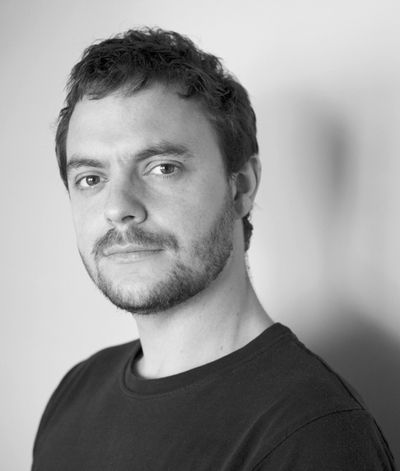The photo on the cover of The Feel-Good Hit of the Year is of a boy who looks like he’s running away from something. It was taken at Labassa, the National Trust-listed nineteenth-century mansion in Caulfield where the author, Liam Pieper, lived as a child.
‘Dad took the photo,’ Pieper says. ‘I can’t remember it, but I assume we were playing Robin Hood, ’cause that was my Robin Hood outfit.’ He points out a spot to the left of the photo, where some of the antique floor tiles are missing. ‘When I was little my favourite game was to lever them up out of the grout and slowly grind them into dust,’ he says. ‘Years later, on a tour of the house with the Trust to record a walking tour for them, they were like: “We can’t find any leads on repatriating these tiles. Do you know anything about them?” And I was like, “Nah man.”’
The cheerful, entertaining casualness with which Pieper tells stories, both in real life and in his book, makes you wonder if he often evades the truth in this way. ‘My parents were liars,’ he says bluntly. ‘I definitely got some of that.’ Pieper and his two brothers were raised among a bohemian mish-mash of Leonard Cohen records, poetry readings and marijuana, after Labassa had been converted into a sort of hippie boarding house in the eighties. His parents explained to their kids that the pot was just ‘very special tobacco’. ‘Sometimes it’s easier to fib,’ he says.
For Pieper, the truth is also inherently complex when writing memoir. ‘A certain amount of – if not dishonesty – then obfuscation of some events, preferential attention to others, elision of timelines goes into any memoir,’ he says. ‘Storytelling is something of a magic trick, and any magician will tell you it’s not about getting the audience to watch the clever thing you’re doing, it’s about getting them to not watch your other hand too closely – misdirection and plotting are the same things.’
When Pieper relates violent teenage confrontations with a jujitsu master, wild drug taking, more than one dramatic arrest and a decrepit share house he describes as ‘a little bit Kerouac, a little bit Dickens’, it doesn’t come across as unbelievable per se, but it certainly paints a very colourful portrait of a kid from the Melbourne ’burbs. But this is what memoir writing is all about, he says. ‘When you write a memoir you’re concentrating on certain moments of your life and the exclusion of others to service the narrative,’ he explains. ‘Everything in the book happened, but it all happened much more slowly than the narrative would suggest. For every dramatic incident, there are a thousand nights spent at home eating pasta and watching The Simpsons.’
The Piepers moved to Oakleigh and then Bentleigh after their idealistic hippie phase at Labassa ended, but they stayed connected to the old world by maintaining a marijuana crop in the backyard. ‘Pot smoke was our matzo ball soup,’ Pieper writes. Teenage Liam finds himself enjoying the perks of a budding career as a drug dealer – the money is great and girls are suddenly interested in him. But after a shocking tragedy he tumbles into alcohol and cocaine binges before an almost Eat, Pray, Love-style time-out encourages him to seek a better life. ‘The worst thing you can do is approach writing about your life like you’re the only person who’s ever felt sad, or alone, or hopeless,’ he says.
The demarcation between the real-life author and the author as a character is one of the trickier elements of writing memoir. ‘The Liam character is a parody of himself, but that’s what I’ve always been,’ Pieper says. ‘You know those Soviet Super-Soldiers who are raised on a diet of war and nutrients and are unstoppable Soviet killing machines? I was like that but raised in a lab for perfect bohemian, onanistic self-indulgence, so that’s what I am.’
As if to make a point of this, the first draft of the book was written on Hydra, the Greek island popularised as an artistic haven in the fifties and sixties by artists such as Leonard Cohen, Charmian Clift and George Johnston, because ‘I wanted to do the most hideously bourgeois thing I could do’. Being far away from his family gave him the distance he needed and the draft was written very quickly.
‘I didn’t really know what I was doing. I thought I was just writing a book of funny anecdotes,’ he says. His greatest inspiration was the late author David Rakoff. ‘He’s a lot like David Sedaris, just a funny, bitchy New York homosexual, which is kind of my spirit animal.’ After the first draft was finished Pieper made intense revisions, seeking to bring out the heart amid the humour by more fully fleshing out the characters of his parents and brothers.

Photography by Tara Nielsen.
‘At the beginning they were more supporting characters who were there as punchlines, rather than real characters buttressed in the narrative.’ The result is a story both fast-moving and moving, with a deep affection for family at its core.
What do his parents think of the book? ‘They were just relieved it wasn’t shit. They raised me to believe in good writing and my mum was like, “I can’t believe you’ve sold us out like this, but we’re very proud of you, it’s a good book.” I was just relieved they weren’t going to sue.’
Pieper admits, ‘Writing the book was intense, in terms of confronting my demons, lining up all my misdeeds in a row.’ Now, at 30, he seems to be at peace with his past; on closer inspection it’s obvious the boy on the cover of the book is running towards something, not away. ‘I mean, that’s what happens when you buy a memoir, right?’ he says wryly. ‘You pay three dollars towards a stranger’s therapy.’


